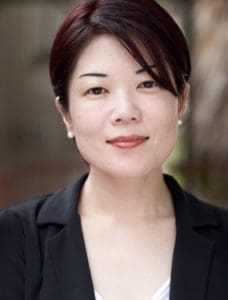Multicultural Family Mediation. Member Spotlight: Toshie Ozaki
Toshie has years of experiences in divorce and family mediation, particularly as it relates to international divorce and custody disputes. She currently teaches online mediation workshops and trainings for lawyers in Japan while living in Visalia, California. She received her Master’s degree in Conflict Resolution and Negotiation from Creighton University and a Certificate in Dispute Resolution from University of California, Santa Barbara Extension.
Toshie has been a member of MBBI for the last ten years. She became interested in engaging with MBBI because of its notable work in international conflict resolution. “I’m sure anyone who is a mediator, who chooses to be a mediator, knows about this organization.”
From Japan to California

Toshie has a diverse cultural background, being born and raised in Japan, while also having years of lived experience in the United States following her undergraduate education. “I missed the United States so much that after I graduated from university, I had to come back to California. And why California? The weather and the people are so nice!” Her experiences and familiarity with both countries mean that she is uniquely positioned to handle the cross-cultural disputes she mediates today and identify gaps in mediation training in both countries.
She explains that mediation in Japan is quite different from the Western style of mediation in that it is more similar to arbitration, but it doesn’t mean that it can’t evolve. Toshie is conducting these virtual workshops on mediation for Japanese lawyers because there have been reports of participants following divorce mediation that feel dissatisfied with the traditional process, that their feelings go unheard. She says that Japanese mediators can learn from the Western style of mediation to adopt a different approach that would better empower the parties.
On Family Mediation
Toshie was first attracted to the field of family mediation because it focuses on the transformation of relationships and the ability to improve the communication between the parties. She acknowledges that as difficult as it can be in custody disputes, the parents generally care for their children, no matter what the situation is. The key is to let the parents collaborate to determine what they can do for the benefit of their children. She finds her work most rewarding when her mediation can allow for a way for conflict parties to communicate with each other in a more rational manner and transition to being good parenting partners.
Where it becomes difficult is when parties simply can’t agree, especially when it affects their children. Her clients often involve one parent from Japan and another from the United States. She explains that the differences in communication styles are often a source of contention that can lead to impasses in the conversation. “In Japanese culture, there’s a word that means ‘to read the air.’ You don’t have to say anything, but it’s expected for the other person to understand the context without using words.” Japanese people often expect their American spouses to do just that and it can be very challenging to have the two parties discuss their feelings together.
The Future of Conflict Resolution
Toshie hopes that as the conflict resolution field expands and becomes more diverse, further opportunities will develop for conflict resolution professionals to engage in the field. It can be fairly difficult for students graduating with conflict resolution degrees to become mediators, start their own firms, and find clients. Peacebuilding and conflict resolution were always Toshie’s passions, but she recognizes that others who have the same ambitions are not always as fortunate. “Government agencies utilize conflict resolution and mediation methods, but often use volunteers. Judges and lawyers are paid for their work. Mediators who resolve disputes should be paid as well.” She hopes that because of the COVID-19 pandemic, online mediation will become more popular and create more opportunities for other mediators to further their careers.
In the meantime, Toshie has enjoyed her virtual work and the ability to hike throughout Central California. Since the pandemic, she’s spent a lot of her free time reading about California state history and their Constitutional Convention of 1849.
Article by Chloe Pan, MBBI Writer
